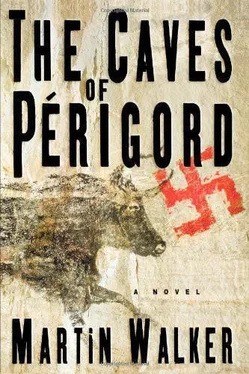Martin Walker - The Caves of Perigord
Здесь есть возможность читать онлайн «Martin Walker - The Caves of Perigord» весь текст электронной книги совершенно бесплатно (целиком полную версию без сокращений). В некоторых случаях можно слушать аудио, скачать через торрент в формате fb2 и присутствует краткое содержание. Жанр: Триллер, на английском языке. Описание произведения, (предисловие) а так же отзывы посетителей доступны на портале библиотеки ЛибКат.
- Название:The Caves of Perigord
- Автор:
- Жанр:
- Год:неизвестен
- ISBN:нет данных
- Рейтинг книги:4 / 5. Голосов: 1
-
Избранное:Добавить в избранное
- Отзывы:
-
Ваша оценка:
- 80
- 1
- 2
- 3
- 4
- 5
The Caves of Perigord: краткое содержание, описание и аннотация
Предлагаем к чтению аннотацию, описание, краткое содержание или предисловие (зависит от того, что написал сам автор книги «The Caves of Perigord»). Если вы не нашли необходимую информацию о книге — напишите в комментариях, мы постараемся отыскать её.
The Caves of Perigord — читать онлайн бесплатно полную книгу (весь текст) целиком
Ниже представлен текст книги, разбитый по страницам. Система сохранения места последней прочитанной страницы, позволяет с удобством читать онлайн бесплатно книгу «The Caves of Perigord», без необходимости каждый раз заново искать на чём Вы остановились. Поставьте закладку, и сможете в любой момент перейти на страницу, на которой закончили чтение.
Интервал:
Закладка:
The fog of war, Clausewitz had called it, and an utter density of uncertainty, ignorance, and impotence had closed around Manners. He had never felt so helpless. The Germans had moved far faster than he had thought possible, and he had been forced by accident and disaster into virtual immobility. And finally now that he had found them, he had neither men nor arms nor plan, not anything at all with which to meet them. Far less stop them.
The little village of Cressensac had grown up around the junction where the main route nationale from the bridge across the river Dordogne at Souillac to the south was joined by the road from the medieval hillside shrine of Rocamadour, and then the combined road went north to Brive. There was a church, two hotels, and two cafes all lined up along the main street.
“Not a bad place for an ambush,” said McPhee. “If they had a tank trap, an antitank gun to command that long road, and a swarm of bazooka gunners in the houses.”
“Well, we haven’t. We’re just observers,” Manners replied, as the apparently sleepy town erupted in a long burst of machine gun fire. A column of soft-topped trucks, motorbikes, and staff cars had suddenly appeared coming at speed over the slight rise in the road beyond the town. The day was clear and the visibility perfect. They could see the kicks of earth in the ground where the bullets hit. There was a moment of shock as time slowed, and Manners was reminded, not of the static quality of toy soldiers but of the clockwork train set he had been given as a boy. A tiny and artificial landscape in stillness save for the whirling movement of the train. Then a truck and staff car collided and German soldiers in camouflage smocks rather than the usual field-gray scrambled out.
“Are these Krauts insane?” marveled McPhee. “No patrols out ahead. No armor up front. Rommel would have knocked every officer back to private if any of his units had ever been so stupid. Maybe the French have a chance.”
There was chaos on the road, as trucks reversed, swung to the side, stalled, and just remained blocking the road as their drivers jumped for cover. Now the French machine gunner had a target, dozens of targets, and rifles and Stens opened up.
“Oh, Christ, if we had a mortar platoon,” said McPhee. Or even the bazookas, thought Manners. Then they could have done the bastards some damage. He looked at the ground to left and right. Some cover, and there were other roads coming into Cressensac. This would not take the Germans long. A standard flank move, covering fire, and that would be the end of this small firefight. Time to go. He nudged McPhee, turned, and prepared to take the long straight road back to Brive, but could not resist a last look at the brave, doomed Frenchmen who had taken on an armored division.
Even as they watched, they heard the growl of a big engine and the clatter of metal treads chewing up tarmac as a Mark IV accelerated over the rise like a maddened bull. Its short-barreled 75mm gun fired into the houses on either side of the village as it simply knocked aside the clutter of trucks and drove on. A half-track loomed quickly behind it, and then another, which stopped at the brow and began the fast punching of its cannon. An antitank gun appeared beside it and opened fire. There went the church tower and the hotel, and then the lead tank stopped and turned at the end of the village and began pumping shells into houses. A sudden flower of fire flashed on the road, well short of the tank. Somebody must have tried throwing a Molotov. Tiny figures began running from the backs of the houses toward the trees, and then went skidding as the machine guns started hunting them. It had taken less than twenty minutes, and there was only one other roadblock before Brive, just as flimsy and ill armed as this one. It was 4 P.M., and the Germans would be in Brive within the hour, where half the Resistance leadership of the region was going to be rounded up and arrested unless he could warn them in time. That would simply put the cap on his twenty-four wasted hours of disaster. He and McPhee jumped into the Citroen and raced away.
It had begun the previous evening at Siorac, a town where the local butcher with the nickname “Le Bolshevik” ran the Resistance. There had been a flimsy roadblock, with only Sten guns to hold it. But they directed him to the station where he found a railway man who knew Marat, and the old lady who ran the Postes et Telegraphes began calling every other switchboard she could reach. Marat had been at Limoges. He was expected at Perigueux, at Brive, at Bergerac. Manners left messages at each place, and sent more by the railway men’s network, for a meeting at Brive the next morning. He went back to his truck and his driver had gone, the empty bottle still propped on the seat. Dismayed, he looked in the back. Empty. The dynamite had gone. He tapped the petrol tank. Just as empty. He had no transport, no explosives, no allies, and no communications. He found the genial Bolshevik in the church, where his men were taking weapons from their hiding place in the roof, and traded his empty truck for an ancient motorbike and an extra can of the oil and petrol mixture it needed.
It took him two hours to reach the Hotel Jardel as night fell, by the bridge over the Dordogne that led north. Trees had been felled across the road every few hundred yards, but there were no guns to cover them so the armored bulldozers of the German combat engineers would simply push them out of the way. They slowed him a lot worse than they would the Germans. The small village of Grolejac lay just down the road, and there was not a roadblock to be seen. There was, however, a Tricolore, so he warned the two men he found in the bar, who looked at him with bleary-eyed lack of interest, as if an angry British officer was a common event. And as he took the road over the bridge and north to Brive, he had the first puncture. He rode until the tire shredded, and continued on the metal wheel, every bone in his body feeling as if were being slowly, methodically broken, and then the wheel seized. He continued on foot in the pitch dark and was nearly run over by a truckful of FTP men coming from Sarlat. He persuaded them to take him back to the town, where they left him at a small command post and raced back toward the river to reinforce Grolejac. He found a man he had taught how to run parachute drops, and at 3 A.M. was sleeping in the back of a commandeered car and being driven to Brive. Then they ran out of petrol, but his escort thought it unreasonable to wake the famous English capitaine who was obviously so exhausted. They woke him shortly after dawn with a fresh omelet, and a glass of wine, and the news that a horse had been sent from the nearest farm to find some petrol. He was too tired to weep.
Manners finally reached Brive just after midday, too late for the meeting he had called with Marat. The town was prematurely celebrating its liberation, despite the desultory sniping at the Germans besieged in their command post at the Hotel Bordeaux. More time lost. He finally tracked Marat down at the monastery of St-Antoine, where an angry meeting was under way and a couple of hundred well-armed Resistance fighters lounged outside, some of them drinking, some striking poses for the local girls. Marat’s Spaniards were grilling sausages around a pair of trucks with “Madrid” chalked on one tailgate, “Teruel” on the other. Manner’s face widened into a smile as he saw McPhee among them.
“What’s going on?” Manners asked, shaking him warmly by the hand and steering him away from the truck to talk in private.
“The commanders are all inside, arguing about who’s in charge and what they should do,” shrugged the American. “The Gaullists want to fight for the river crossings. The Communists want to reinforce the attack on Tulle, where a full German garrison is supposed to be on the point of surrender. The rest want to hold Brive as a fortress.”
Читать дальшеИнтервал:
Закладка:
Похожие книги на «The Caves of Perigord»
Представляем Вашему вниманию похожие книги на «The Caves of Perigord» списком для выбора. Мы отобрали схожую по названию и смыслу литературу в надежде предоставить читателям больше вариантов отыскать новые, интересные, ещё непрочитанные произведения.
Обсуждение, отзывы о книге «The Caves of Perigord» и просто собственные мнения читателей. Оставьте ваши комментарии, напишите, что Вы думаете о произведении, его смысле или главных героях. Укажите что конкретно понравилось, а что нет, и почему Вы так считаете.












